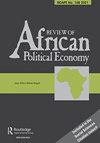关注苏丹——关注紧缩
IF 1.4
3区 社会学
Q1 AREA STUDIES
引用次数: 1
摘要
廉价借贷已经结束,紧缩政策又回来了。2023年国际货币基金组织(IMF)关于非洲的区域报告认为,非洲大陆正处于一个转折点:从2007年到2022年,非洲在全球资本市场上的借贷不断增加的阶段已经结束。非洲欧洲债券的存量有所增加,2021年12月估计为1400亿美元(Smith 2021),但猖獗的全球通货膨胀和借贷成本的增加结束了这一阶段。非洲新的欧洲债券发行量从2021年第二季度的140亿美元下降到2022年第一季度的60亿美元,而美元有效汇率创下20年新高(IMF 2023)。在人民币国际化及其最近的数字化(邓2023)带来的日益严峻的挑战下,这再次巩固了美元作为世界货币的地位,牢牢地坐在全球货币体系的顶端。与全球南方的许多其他国家一样,非洲国家再次在全球货币体系的底层根深蒂固。这一动态揭示了“资本主义金融作为帝国主义关键载体的非凡历史连续性”(Alami 2019,2),而非洲各国政府正被推动重新制定紧缩政策。自2022年春季以来,非洲各国政府已停止发行欧洲债券(IMF 2023),现在,在2023年中期,继2020年赞比亚和2022年加纳违约之后,人们关注的是下一个非洲政府将违约。紧缩政治的新阶段凸显了帝国主义的持续负担,而非洲国家则在努力应对几个世纪以来不均衡和综合发展的历史分层的所有特征(Ashman,2009年)。我们在第174期的社论认为,全球经济放缓导致结构调整计划重返非洲大陆,因为在21世纪头十年,低利率推动了大多数非洲国家的负债率上升。如该社论所述,ROAPE记录了20世纪80年代第一轮这种动态的出现,以及国际金融机构在执行SAP紧缩政策中的作用,以及不同国家在国家层面产生的谈判、抵制或遵守政治。正如Alami(2018)所说,在大多数新兴或工业化经济体中,都可以发现一系列特征,这些特征超出了全球货币市场上较弱货币对较强货币的简单从属关系。这些特点在大多数非洲国家都可以找到:国际投资者对国家政策进程的持续严格审查、汇率和高利率的高度波动、容易动摇和迅速变化的脆弱金融声誉,再加上金融危机时期资本外逃同样迅速,以及对发达资本主义国家货币政策的普遍依赖。所有这些特征都导致了贫穷、非工业化国家的“金钱恐怖主义的严重性”(Alami 2018,28)。资本对物质现实的控制对人们对现实的想象和感知有着强烈的控制,尽管并非不可动摇。其中一个机制本文章由计算机程序翻译,如有差异,请以英文原文为准。
Keeping eyes on Sudan – keeping eyes on austerity
Cheap borrowing is over and austerity is back. The 2023 International Monetary Fund (IMF) regional report on Africa argues that the continent is at a turning point: a phase of a constant increase in African borrowing on global capital markets, lasting from 2007 to 2022, has come to an end. This saw an increase in the stock of African Eurobonds, which in December 2021 were estimated at US$140 billion (Smith 2021), but rampant global inflation and the increase of borrowing costs put an end to this phase. The issuing of new Eurobonds in Africa declined from US$14 billion in the second quarter of 2021 to US$6 billion in the first quarter of 2022, while the US dollar effective exchange rate reached a 20-year high (IMF 2023). This has once more reinforced the US dollar – under the rising challenge posed by the internationalisation of the Chinese yuan and its recent digitisation (Deng 2023) – as world money, sitting firmly at the top of the global money hierarchy. African countries, like many others in the global South, are once more entrenched low down in the hierarchy of the global monetary system. This dynamic brings to light the ‘remarkable historical continuity of capitalist finance as a key vector of imperialism’ (Alami 2019, 2), while African governments are pushed towards the re-enactment of austerity policies. Since spring 2022, African governments have stopped issuing Eurobonds (IMF 2023) and now, halfway into 2023, eyes are on which African government is going to default next, following on the default of Zambia in 2020 and Ghana in 2022. A new phase of austerity politics highlights the persisting burden of imperialism, while African states grapple with all the features of centuries of historical layering of uneven and combined development (Ashman 2009). Our editorial in issue 174 argued that the global economic slowdown has led to the return of Structural Adjustment Programmes (SAPs) to the continent, because of the increased rates of indebtedness of most African countries promoted by low interest rates in the first decade of the 2000s. As referenced in that editorial, ROAPE documented the emergence of this dynamic the first time round, in the 1980s, and the role of international financial institutions in enforcing SAPs’ austerity policies, alongside the politics of negotiations, resistance or compliance that these generated at the national level in different countries. As argued by Alami (2018), there is a set of features that can be identified in most emerging or industrialising economies that goes beyond the simple subordination of weaker currencies to stronger currencies on global monetary markets. These features are to be found in most African countries: a persistently strong scrutiny by international investors over national policy processes, high volatility of exchange rates and high interest rates, fragile financial reputations that are easily shaken and rapidly changing, coupled with equally rapid capital flight during moments of financial crisis, and a general dependence on the monetary policies of advanced capitalist countries. All these features lead to a ‘severity of the terrorism of money’ (Alami 2018, 28) that characterises poor, non-industrialised countries. Capital’s hold on material reality has a strong – though not unshakeable – hold over people’s imagination and perception of reality. One of the mechanisms through which this
求助全文
通过发布文献求助,成功后即可免费获取论文全文。
去求助
来源期刊

Review of African Political Economy
Multiple-
CiteScore
3.00
自引率
7.70%
发文量
29
期刊介绍:
The Review of African Political Economy (ROAPE) is a refereed journal committed to encouraging high quality research and fostering excellence in the understanding of African political economy. Published quarterly by Routledge, Taylor & Francis Group for the ROAPE international collective it has since 1974 provided radical analysis of trends and issues in Africa. It has paid particular attention to the political economy of inequality, exploitation and oppression, whether driven by global forces or local ones (such as class, race, community and gender), and to materialist interpretations of change in Africa. It has sustained a critical analysis of the nature of power and the state in Africa.
 求助内容:
求助内容: 应助结果提醒方式:
应助结果提醒方式:


